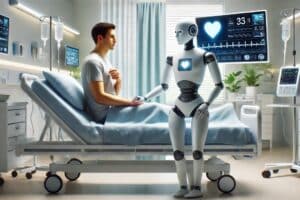L’intelligenza artificiale (AI) ha also arrived in the healthcare sector with some new applications that are already usable.
AI could eventually enter almost all productive sectors, but in some it proves to be more useful, and therefore has less difficulty penetrating.
The progress generated by AI: the best applications in the healthcare sector
The healthcare sector is one of those in which AI can be most useful.
In particular, it is very useful in the research sector in this field, given that research in the healthcare field often relies on data analysis, and AI can be excellent for analyzing data, especially when it comes to large amounts of data that are otherwise difficult to analyze.
However, it is not the only sector in which the use of tools based on intelligenza artificiale is already spreading, because all those in which there is research based on data analysis can successfully benefit from it.
For example, according to the co-founder and CEO of OpenAI, Sam Altman, AI could bring overall exponential progress to the entire humanity, for instance in the climate, aerospace, scientific fields, etc.
Certainly, the scientific field is not only one of those in which it has the greatest potential, but it is also already one of those in which it is used relatively widely.
What makes AI particularly effective in the scientific field is the great help it can provide to scholars and researchers, so much so that in this field it is already playing an important role.
The most innovative AI applications in the healthcare sector
The healthcare sector is particularly connected with scientific research.
So it should not be surprising that it is one of those in which AI is already spreading.
For example, in this field it is used to accelerate the discovery of new drugs, or for the improvement of imaging. It is also used in diagnostics and in the delivery of healthcare.
In reality, the steps taken so far are probably only the first steps of a long journey, also because in theory the aid that AI can provide in the healthcare sector is truly wide and deep.
The care will probably always be managed by expert human doctors, but they will increasingly be assisted by tools equipped with artificial intelligence that can improve, speed up, and automate their work, while at the same time reducing errors.
Pharmacology
Some of the most promising AI-based apps in the healthcare field are those that help researchers discover new drugs, that is, new molecules to be used as active ingredients in drugs.
The fact is that the molecules to be analyzed are thousands, and they become millions if we also consider those synthetic ones not present in nature but creatable in the laboratory.
Testing the efficacy of these molecules in the laboratory is very difficult, very long, and sometimes even simply impossible.
Instead, using AI tools like neural networks, millions of molecules can be analyzed to try to predict their effectiveness. Additionally, the potential effectiveness of new drugs under study can also be analyzed before they are examined with often costly clinical trials.
In this way, time and costs are reduced, but also the need to test molecules and drugs on animals or humans.
Imaging
A classic use of AI in the healthcare sector is as an aid for imaging.
There are, for example, apps that allow even non-experts to acquire high-quality ultrasound images of the heart, for early diagnosis of potential diseases without having to go through specialist studies.
These apps on one hand help the operator to acquire high-quality images, while on the other hand they help them later to interpret them.
Something like this also exists for radiographs.
An app, for example, can analyze and classify chest X-rays to detect anomalies in a few seconds, reducing time and costs.
It is estimated that an app for interpreting radiographic images is 10,000 times faster than an average radiologist.
Moreover, these apps often manage to identify smaller anomalies, thus sometimes anticipating by months the diagnoses of diseases such as malignant lung nodules.
Diagnosis
AI apps can be useful not only for analyzing images, but also for helping doctors make diagnoses.
There are some designed specifically to leverage artificial intelligence in the clinical decision-making process.
This is an integration within the clinical decision-making process carried out by human doctors, and it uses predictive analysis and natural language processing to help doctors make more informed decisions.
Furthermore, these tools also allow for the customization of drug prescriptions, simplification of operations, and optimization of resource management.
Healthcare assistance
Thanks to voice recognition, some apps already used in the healthcare sector allow the automation of some services offered to patients.
For example, they help to communicate with patients who have language difficulties, because they are equipped with voice recognition based on artificial intelligence that automates the process of understanding atypical language. They are also used in video-conferencing with some of the main software available today.
Other apps use artificial intelligence to simplify the delivery of healthcare, automating administrative tasks such as appointment scheduling, data analysis, and patient follow-ups.
Obviously, all these uses are not isolated compartments, but are often possible simultaneously on the same patients, or in support of one another.
For now, apps often tend to provide a single service, but in the future, it is imaginable that they could, for example, communicate with each other, perhaps thanks to basic data exchange platforms.
The journey has already begun, even if the road ahead still seems to be very long.


